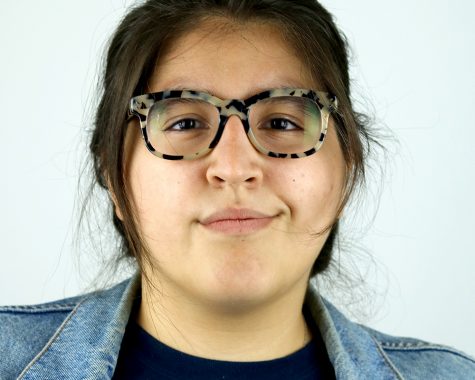Lecture speaker discusses ‘kicking the bucket list’
September 25, 2018
Topics of how humans perceive death, what humans should do in life and “kicking the bucket list” were covered during the 28th annual Phi Beta Kappa lecture Tuesday night in the Doudna Fine Arts Center Lecture Hall.
Scott Samuelson, an author and a philosophy professor at Kirkwood Community College in Iowa, gave the lecture, which was called “Kicking the Bucket List: Death and the Art of Shinning,” and focused on the human life and how people can “shine” while they live and avoid wasting time in life by living based on elaborate bucket lists.
He discussed how people respond to death, which he said happens in three approaches, and how this ties into how people live.
The first approach to death is called the “forget about it” attitude.
He said often people remain “clueless” to “life’s flipside,” referring to an incident he was involved in at airport where he attempted to assist in saving a woman by holding her head.
The woman died, but he said American Airlines personnel only used a sheet to cover the incident and did not acknowledge that it actually happened after the fact.
“All we know of death is a tiny truth, a hugely important tiny truth,” he said. “We’re all going to die.”
He said though everyone’s fate is known, people still pretend that the truth about dying is not the truth and therefore ignore that death occurs.
When this approach does not happen, the next one is the “fix it” approach.
“When we do confront the fact of our mortality our default culture’s setting seems to be a fix it mentality,” he said. “We call in the medics, we pour our energy into curing diseases and extending life, we debate the funding of health care … like you, I am a beneficiary in this fix it quest.”
However, he said society’s relationship to death and dying can often be unhealthy because he said people get so used to “fixing the machine” that we forget we’re living in a body.
“The more we see our life as a mechanism to be fixed, the more our entertainment is filled spectacular dream-like appearances of death and violence from zombies to mortal combat,” he said. “I worry that we’re forgetting what it means to exist.”
He said the third approach is the “face it” approach, which characterizes much of religion, art and humanities and a portion of science and politics and regards nature as something people must suffer through in order to become what they are meant to be.
“We go through tough times not wanting to deal with them, (but) they become part of our story,” he said.
He said the balance between the three approaches and thus enhancing life is by facing death more than what people already do.
However he said when the reality of death is brought to the conscious mind, people tend to create this elaborate bucket list that is filled with things like “making out on the Eiffel Tower or holding a human brain.”
But he said bucket lists do not get what is truly valuable to everyone’s time and instead creates a list of “consumerist” ideas that are marketed.
“Acquire me and I’ll make your life sufficiently interesting,” he said referring to the current idea of a bucket list. “It’s a consumerist model of the good life.”
Therefore, people need to kick the bucket list and accept that a good life is one that is fulfilled by “savoring” life and accepting it for what it is and paying attention to everything that happens in one’s life and what matters.
Instead of a traditional bucket lists, he offered a revised version.
“I want to use the gift of my consciousness to pay attention to my earthly existence, I want to establish myself and contribute to the world by pursuing my callings, I want to find a rhythm in how I spend my time so that I can perform the essential verbs and then I want to open myself up to joy,” he said.
He said people can have a “good life” and can do so even in just a week.
“Seven days … is enough time to perform all the essential verbs (such as loving, sleeping and eating),” he said.
Ultimately, he said the more meaningful things people do, the more time they seem to have and the more joy people find.
Finally, when asked to give advice to students who are looking for their calling, he said unplugging from social media and traveling could help.
“We have it in us that we know where we’re going, it’s just a matter of trusting that and getting to that,” he said. “For me at least, going to college and being a part of a liberal arts education was important for me to see not only the possibilities for jobs but the possibilities for how human beings have done things and to see new styles of living, to meet friends who helped me, to know myself better all of those things were important in finding (my) calling.”
He also said having the courage to go out and find their calling is needed.
“I think it takes a certain amount of courage. I often know students who feel like they have it in them to do something but then they’re like, ‘Well I don’t know if I should really do that, I should probably go down this road instead,’ and you know what, maybe at times that is a wise choice,” he said. “But, sometimes it takes a little bit of courage to be willing to take that risk so that you can find yourself.”
Analicia Haynes can be reached at 581-2812 or [email protected].



















































